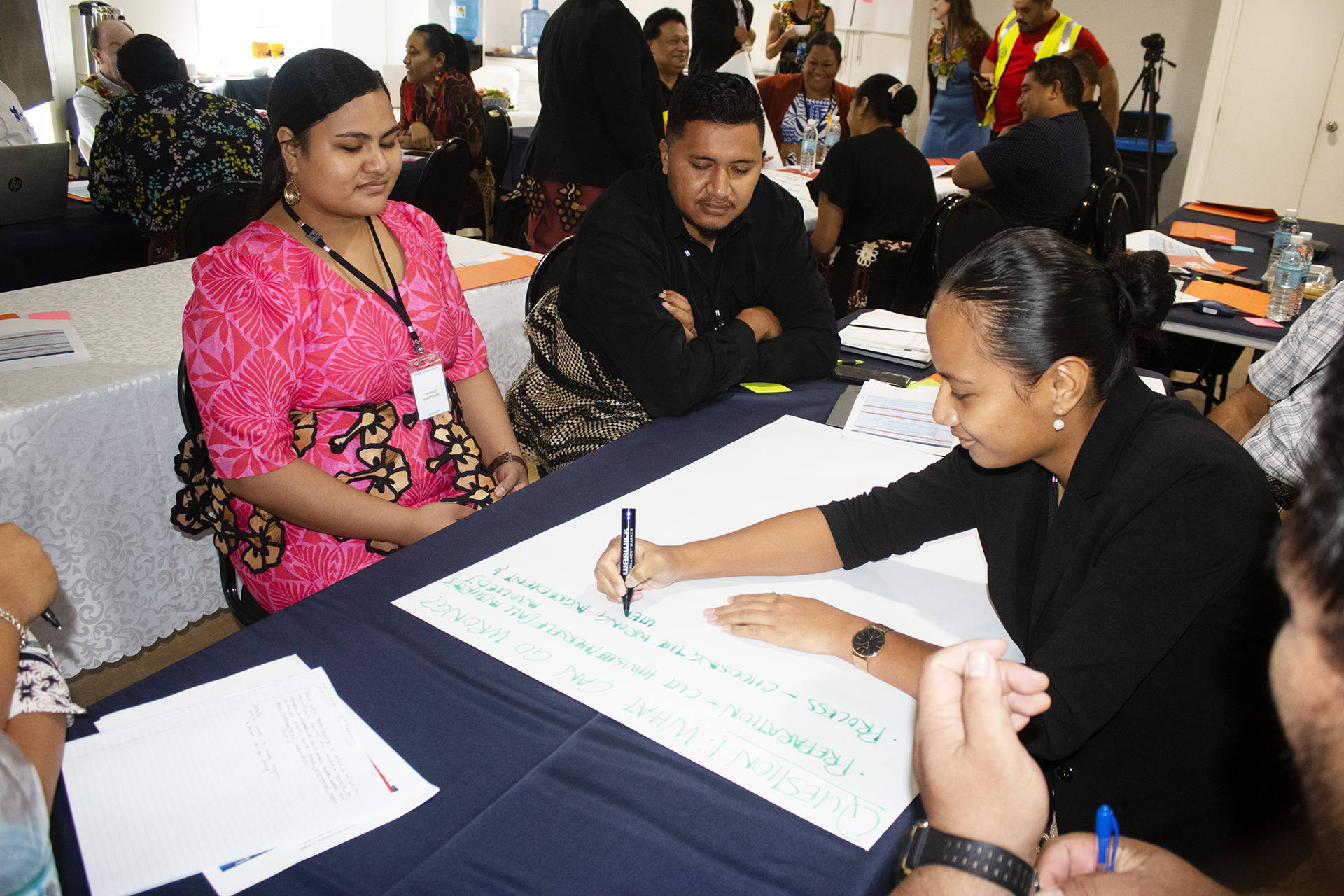On 15 January 2022, a massive volcanic eruption shook the small island nation of Tonga at a scale that the country hadn’t witnessed since 1883. The volcanic eruption was followed by tsunami waves which struck the west coast of Tongatapu, ‘Eua and Ha’apai islands.
Two weeks after the volcanic eruption, Tonga detected cases of COVID-19 and initiated a response to what became their first wave of community transmission. “We were stretched thin,” said Dr Joseph Takai, Senior Medical Officer at Tonga’s Ministry of Health, when asked about the impact of three simultaneous emergencies. “The tsunami damaged an undersea communications cable, cutting us off from the rest of the world for over a month. So, we had to rely on ourselves and draw from previous efforts to prepare for such emergencies,” he added.
Elaborating on the importance of emergency preparedness, Dr Takai shared “Although our first case of COVID-19 was not until 2022, we had started preparing for it since 2020. So that whole period—between 2020 and 2022—we were trying to organise ourselves, create guidelines and train health care workers. When COVID-19 eventually hit us, we were ready.”
Identifying and addressing risks: an evidence-based approach to emergency preparedness
The Government of the Kingdom of Tonga has since used lessons learned from the triple emergency response to enhance the country’s preparedness for future emergencies. As part of these efforts, it is working alongside the World Health Organisation (WHO) to improve multi-hazard response planning and manage concurrent risks. WHO Country Liaison Officer, Dr Anup Gurung emphasized how funding from the United States Agency for International Development (USAID) is enabling WHO’s support to Tonga. “This initiative aligns closely with WHO and USAID’s broader goals of promoting health security, building resilient health systems, and fostering partnerships for sustainable development,” he said.
From 28 February to 1 March 2024, the Tonga Ministry of Health in collaboration with WHO convened a multi-sectoral group of participants active in health security and emergency preparedness and response for a workshop analysing health risks using WHO’s Strategic Toolkit for Assessing Risk (STAR) tool. During the three-day workshop, representatives from different sectors applied a stepwise process to identify hazards facing the country, describe the seasonality and likelihood to occur, and assess their potential impact. The workshop was co-facilitated by the Ministry of Health, the National Disaster Risk Management Office and WHO.
When risks associated with disasters are not effectively managed, they can result in preventable injury and loss of life. Among the hazards discussed were disease outbreaks, tropical cyclones, flooding and other disasters that are increasingly exacerbated by climate change. Many Pacific islands have witnessed the impacts of climate change and rising sea levels. Increasingly frequent flooding, storm surges and soil erosion pose a significant threat to health security.
“In small island developing states like ours, we’re seeing first-hand the impact of climate change,” said Dr Ofakiokalani Tukia, acting Chief Medical Officer for public health in Tonga, who played a key role in coordinating the STAR workshop in Tonga. “Given that this is an El Niño year, we are evaluating potential health risks—including physical injuries, food-and water-borne illnesses and vector borne infectious diseases—from possible tropical cyclones or droughts,” she added.
Tonga will use insights from the STAR workshop to inform emergency preparedness activities, including an upcoming Joint External Evaluation and the national action plan for health security. The STAR workshop is a catalyst for countries to gain consensus on priority hazards to further improve emergency preparedness, response and multi-sectoral coordination.
Employing a multi-sectoral approach to risk management
WHO’s Strategic Toolkit for Assessing Risk (STAR) brings together stakeholders from multiple sectors to assess disaster-related risks. In Tonga, STAR participants included representatives from the Ministry of Meteorology, Energy, Information, Disaster Management, Environment, Climate Change and Communications; the Ministry of Agriculture and Food, Forests and Fisheries; Revenue and Customs; Tonga Airport Limited; the Port Authority; His Majesty’s Armed Forces (HMAF); Tonga Police; and the Ministry of Health.
Speaking to the importance of this multi-sectoral approach, Viliami Tongamana, National Inter-Cluster Coordinator, National Disaster Risk Management Office said, “Over the last few days, we’ve had the opportunity to work together with stakeholders across various Ministries, departments and organisations—learning from each other and creating cross-cutting channels for communication. This collaboration alone may determine how successful or unsuccessful we are when responding to future disasters.”
Strengthening Tonga’s capacity to assess and mitigate disaster-related health risks
Tonga is the first Pacific island country to undertake a STAR risk assessment. Speaking of the significance of this event, United States Embassy Chargé d’ Affaires Bradley Coley said, “Today marks a step forward in our collective efforts to address public health risks and enhance preparedness in the Pacific region. In a world facing ever-evolving threats, from infectious diseases to natural disasters, the importance of robust risk assessment and preparedness cannot be overstated.”
Through tools like STAR, WHO supports countries to plan for and manage health emergencies at the national and subnational levels as aligned with the International Health Regulations (IHR 2005), Asia Pacific Health Security Action Framework (APHSAF) and the Sendai Framework for Disaster Risk Reduction (2015-2030).















